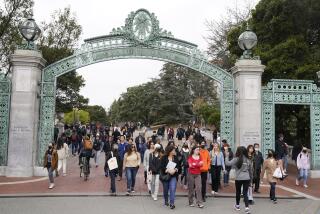Deaths of 2 Teen Girls Alert Parents to Risks
- Share via
Two Ventura County teenage girls are slain in a month.
Melinda Brown, 18, is hanging out at a bowling alley in Simi Valley just three blocks from home when she disappears. Two weeks later a group of hunters discovers her body dumped in a remote area of Los Padres National Forest, shot once in the stomach.
Kali Manley, 14, is at a friend’s house in Ojai for a slumber party when she climbs barefoot into a truck with two older males she barely knows. A week later David Alvarez, 22, leads authorities to her body--strangled and stuffed into a drainpipe in the Ojai back country.
The cases are different, but the emotion is the same.
Daughters have been lost.
“In think this is the worst nightmare that could happen to someone with a daughter,” said Ojai City Councilman Steve Olsen, who has a 15-year-old daughter. “I think this is a wake-up call to all parents of the valley. This could happen anywhere, even in a pristine area like the Ojai Valley.”
In the wake of these two killings, shaken parents across Ventura County are reassessing their parenting and the dangers of the world around them. Is there anything parents can do to keep their children safe? Or is raising a child--particularly a girl--in today’s world simply a gamble?
Police officers, educators, psychologists and family therapists say raising children is inherently fraught with risk--just like life.
“No matter what we do, something could still happen,” said Myron Dembo, a professor of educational psychology at USC’s School of Education.
“It could happen to the best of parents. All we can do is decrease the probability.”
Senior Ventura County Sheriff’s Deputy Ed Tumbleson, who teaches a 10-week course in Thousand Oaks for parents of rebellious teens, agrees.
“These are the chances we take in this world we live in today,” he said.
But Tumbleson’s course--called the Parenting Project--focuses on what parents can do.
“I truly believe that a parent that does everything they can, can reduce the chances for these things to happen,” he said. “They should be on the lookout for signs of drug involvement by their children, and parents should be especially wary of young girls who show interest in older men.”
Tumbleson said single parents--working long hours to support their families--face the biggest challenge.
“We definitely have a latchkey kid syndrome,” he said. “Not all of them are poor parental situations. But sometimes a single parent needs to reach out and find some help . . . to create those support elements that they need to keep their children from getting into trouble.”
Other experts suggested that single parents establish networks with neighbors, extended family, teachers or even other single parents to cooperate in looking out for children.
Parent Conducts Spot Checks on Sons
Tumbleson, who has two teenage sons, said parents need to know that their teens are going to safe places to hang out with friends and not hanging out on the street, where they are most vulnerable.
He says he will not allow his sons to go out unless he knows where they are going and that a parent will be there.
“My kids don’t know most of their friends’ last names,” he said. “But I tell them, ‘You’re not going over until you find out. I want to know his address and his phone number.’ ”
Tumbleson also does spot checks on his sons, cruising unannounced by parties to make sure the party is chaperoned and his sons are there.
In his parenting course, Tumbleson requires parents to compile an address book with first and last names, addresses and phone numbers of their children’s friends.
Dr. Priscilla Partridge De Garcia, a clinical psychologist and mother of five with offices in Camarillo and Westlake Village, suggests going a few steps further: Establish a curfew and give kids pagers.
“Know where they are; be able to contact them,” she said. “Have them have some kind of code on the pager that means they are in trouble--or a code word on the phone--something prearranged. . . .”
She also agreed that parents need to pester their teens for addresses and names, even when the teens tell them no parents ask for information like that.
“Kids will say that’s weird, no one else does that,” she said, “but better to have them think you are a nerdy parent and have them alive.”’
The key, said Partridge de Garcia, author of “Guilt Free Parenting,” is not to be afraid to have your kid not like you.
“I’ve had my kids tell me they hated me, I was the worst mother in the world, I ruined their friendships,” she said. “But for their own protection you need to draw boundaries that they are afraid to draw because they want to be popular or liked.”’
USC professor Dembo, too, advises parents not to be afraid of being viewed by their teens as overly controlling.
“Parenting and friendship: Sometimes they coexist but sometimes they don’t,” he said.
Unfortunately, he said, parents often don’t receive words of thanks they long to hear from their teens until many years later.
“If you really want immediate gratification, you shouldn’t be a parent,” he advised. “It takes a long time.”
Partridge de Garcia said that while young boys face dangers from sexual predators, teenage girls are even more at risk--as evidenced by recent Ventura County history.
In 1992, Ventura High School graduate Katrina Montgomery left a party in Oxnard and was never heard from again. Her bloody pickup truck was found hours later in Angeles National Forest with the key still in the ignition, but her body was never found.
Two years ago, the Ventura County district attorney’s office reopened the case and in late 1997 arrested a 21-year-old North Hollywood man on suspicion of killing Montgomery. A judge has ruled that Larry Robert Nicassio be tried as an adult, even though he was a juvenile at the time of Montgomery’s death. His next hearing is Jan. 11.
Self-Esteem Lessens Risk for Teen Girls
Anacapa Middle School student Jenniffer Rose Vernals, 15, disappeared from downtown Ventura one afternoon in 1996. Her body was discovered by a rancher in a canyon near Montecito. Her killer is still at large.
“We have to be really careful with girls,” Partridge de Garcia said. “This is a culture where girls are sex objects. From the time they are little, there are overt and covert sexual overtures to them. . . . That is the way our culture sets us up.”
Susana Arce, vice principal of Nordhoff High School in Ojai, where Kali Manley was a freshman, said it is imperative for both sexes--but especially girls--to learn self-esteem so that they have the strength to stand up for themselves as individuals.
“Girls are so swayed by attention of the opposite sex,” she said. “They don’t realize the dangers, the nature of the person they are with.
“I can see how any number of girls would have been charmed [by an older man],” Arce said of Manley’s trust of Alvarez. “The difference between a 14-year-old and a 22-year-old is that any 14-year-old will be flattered by the attention of an older male.”
But Arce warns parents against becoming dictators or stripping away their child’s freedom. The experts said teens are naturally curious, daring and ready to see the good in other people. And that is not all bad.
Dembo said studies show that even when parents tell children over and over not to go with someone, if a stranger rolls up and says, “I’ve lost my dog; will you help me?” children will go.
“Kids are very trusting,” Arce said, “and we don’t want them to be paranoid. There’s that naivete of youth that’s valuable, and yet it can be dangerous.”
Ventura Police Lt. Carl Handy is not working on either of the recent cases, but speaking as the father of a 19-year-old daughter, said perhaps the most a parent can do is instill in children values they can live by.
“By the time they are [teenagers], they are pretty independent,” he said. “They are seeking new life experiences and looking to establish themselves in society as a person. It’s a struggle for them.”
No matter what the case, experts agreed, there is no training for being a parent, and even with the best parents in the world, awful things can happen. Many teenagers will do things for excitement that may not be safe.
“You don’t want to scare them,” Dembo said. “It’s hard to make teens understand danger signs when they are having a good time.”
More to Read
Sign up for Essential California
The most important California stories and recommendations in your inbox every morning.
You may occasionally receive promotional content from the Los Angeles Times.










